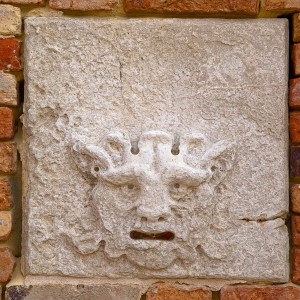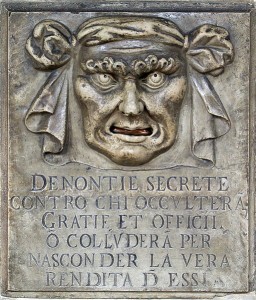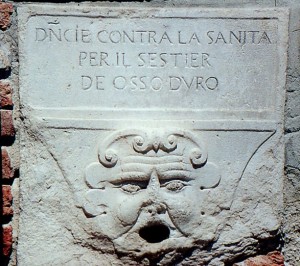After the attempted coup tented by Baiamonte Tiepolo, in 1310, were built in Venice several “Bocche di Leone ” (Boche de Leon) or Mouth of the Lion for the secret complaints. It is so called because in the reliefs of white marble was carved an image of a face of a lion, to remember the lion of St. Mark, the symbol of the Venetian State, or a bad face expression. In place of the mouth there was a hole to insert sheets of paper with the secret complaints. They letters would have been kept secret but they could not be anonymous and needed to have at least two witnesses to be accepted.
 |
| Bocca del Leone "San Martino" |
They still can be seen in Venice, despite dating back to the times of the Serenissima Republic, in the Palazzo Ducale, on the wall of the church of S. Mary of the Visitation (Maria della Visitazione a Zattere), in the Church of St. Martin ( Castello), and St. Moses (in the San Marco district).
The complaints could relate various types of crimes including the non-compliance to health, blasphemy or tax evasion . Were distributed at least one in each district, near the Judiciary places, the Doge’s Palace or the churches, and were used to collect information, reports or accusations against those who did the various crimes.
Only the heads of the District could go to the back of the wall where the various cassettes were, whose keys were kept by the Magistrates, and each of them picked up the accusations for a different type of offense: on charges of tax evasion, related to the blasphemers, and various others.
 |
| Bocca del Leone "Ducal Palace" |
Sometimes the accusation were without foundation, due to envy or hatred of a person and those were just burned, otherwise these reports were reported to the Serenissima, the State.
Il Consiglio dei Dieci 'The Council of Ten" were accepting anonymous complaints only if at stake was the State safety, and with the approval of the five/sixths of the voters. But it was not so easy as you may think to accuse someone. In 1387 the Council of Ten ordered that anonymous allegations sent without signature of the accuser and without reliable witnesses for the prosecution on the circumstances reported, were to be burned without take no account .Unless the secret denunciations were presented with charges of treason and conspiracy against the State. Through the mouths of the lion and the secret complaints were discovered many crimes that would have never come to the attention, that could have caused serious damage to the Republic of Venice.
Probably , however, were also accused and imprisoned some innocent people.
 |
| Boccal Del Leone, "Santa Maria della Visitazione" |
The Council of Ten scrupulously applied the law established by the “Avogadri dello Stato” the "investigators of the State" saying that it was necessary to conduct a thorough investigation to establish the truth, justice and clarity, and do not judge anyone on the basis of suspicions, but research evidence in practice , and at the end a true judgment. If accused anyway the accused could ended up spending months in prison, the infamous prisons under the Ducal Palace, prison of the Piombi or the Pozzi. And they were often tortured that some were confessing crimes they had not even done.
Thank God things have changed and nowadays also in Venice you can simply send an email with your denunciations or complains directly to the “Comune di Venezia”, the Town Hall of Venice.
I often wonder though if anyone still checks the "bocche" for random grievances left by some funny "veneziani" in the dead of the night.
From Venice With Love,
Giada
#giadavalenti #PBS #FromVeniceWithLoveTour #VeniceFunFacts

Buon giorno!
ReplyDeleteDo you have a photo of the Boche De Leon located at San Moises?
Grazie